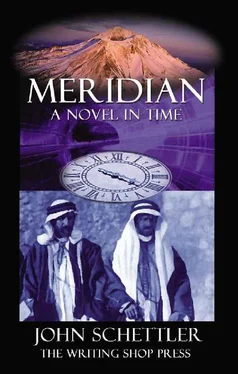“They weren’t even published until 1625,” Maeve put in adamantly, her arms folded with finality.
“Yes, the public version of the report circulated in 1625, but we know all the senior members of the Virginia Company must have seen Strachey’s letters much earlier; immediately, in fact. I’m certain that Shakespeare must have been privy to them—probably even had a copy; perhaps in his study at the Globe. And there may be other documents or books there that would shed light on this question. Perhaps I’d find a copy of Thomas’ History of Italy. Many of the characters names in the play are thought to be derived from that narrative.”
He looked at Dorland, reaching for some support. “Look here, Paul. This may be one of those little threads in the weave of time you’ve been talking about. What if there had been no real tempest at sea when the fleet set out?”
“That’s an Imperative,” Dorland explained. “The weather on a given day is not subject to a willful act by any person. It can’t be changed.”
“Fine.” Nordhausen brushed the point aside and pressed on. “What I’m saying is, that if we can establish a clear link between Shakespeare and the Bermuda Pamphlets at the time he wrote the play, then you may have a chance to hunt down one of those little insignificant moments in time that gives rise to The Tempest , one of Shakespeare’s last, and greatest, plays. Why, some even think it was the summation of his work. First we find Strachey’s letters; then we try and hunt down your intersection somewhere on the Meridian—”
“Pushpoint,” Dorland corrected him.
“Whatever,” the professor hurried on. “We do other missions to follow that lead back in time and see what might have really seeded the incident. It had to be something that happened at Plymouth before the expedition put out to sea. Look, the fleet left on June 2 nd. We have the date right in Strachey’s report. If they had set sail a few days earlier or later, then no storm at sea; no shipwreck on Bermuda; no report reaches London in 1610, and perhaps no play! What a paper that would make!”
“No!” Maeve’s eyes widened with her exclamation. “No, Robert. Absolutely, positively and authoritatively: No. Are you crazy? What if Shakespeare is there when you decide to take a peek into his office.”
“Highly unlikely,” Nordhausen argued.
“Why? You seemed so certain he would be at the site earlier tonight, right, Paul?” Maeve gave Dorland a quick glance, beginning to pull him over to her side on the matter.
“He’d be there, alright,” said Nordhausen, “but he’d be in the upper gallery watching the play. There were official guests to be coddled. He wouldn’t be futzing about in his office during the performance.”
“Say something, Paul.” Maeve gave Dorland a disparaging look. “If he bumbles into someone, he could introduce variations in the Meridian. Am I right?”
“Well…” Dorland thought carefully before he spoke, and they both waited as he tapped his finger on the table, catching up to the implications of the argument at last. “The professor may be right that the Old Bard would probably be in the gallery, but probabilities are the province of Outcomes and Consequences.”
“There,” said Maeve, seizing on the moment to assert herself again. “You should have submitted this idea in detail, Robert, along with all this business about the Bermuda Pamphlets, and Strachey’s letters and God only know what else you may be after with this. We can’t run probability numbers without specifics. You, of all people, should know that!”
“But really,” Nordhausen made one last sortie. “What would be the harm? I’m not talking about some dolt blundering into Shakespeare’s offices and rifling the place for lost documents—”
“No,” Maeve interrupted him. “You’re talking about a bemused history professor on a quest for primary source material in the office of one of the most significant ‘Prime Movers’ of the last 500 years, right? Are you telling me you’re going to be careful once you get your beady eyes on that man’s desk? You mean to say that you could resist the urge to open that desk drawer, or to slip a volume or two out of his bookcase? Lord, I wouldn’t be surprised if you actually tried to make off with something significant and bring it back!”
“Well I’m not that daft,” Nordhausen was getting angry.
“That would be a serious violation,” Dorland put in matter of factly.
“Damn right,” said Maeve. “I just won’t allow this, so get it out of your head. If you plan on going tomorrow, then I am going to be glued to your right arm. Understand?”
Nordhausen gave her a sheepish look. “Oh, what’s the use,” he said sullenly, a defeated look on his face. “I mean what good is the experiment if you don’t try to answer questions like this? Don’t get all bent out of shape now, Maeve. Nothing’s going to happen anyway. We’ll get all dressed up for the play and the Arch won’t work. Mark my words.” He fished out his pocket watch again, snapping it open to look at the time. “Nine-thirty-five,” he muttered. “Where’s Kelly and his numbers machine? Are we going to sit here all night?”
Dorland saw that, with the loss of his fishing expedition, Nordhausen was going to lapse into his famous brooding intellect again. Lightning flashed in the sky outside the study, and it seemed there was a great deal of noise out on the street. He suddenly felt that the whole evening was spinning off kilter for him. All of the restless excitement he had brought with him to the meeting was dissipating into a rising sense of anxiety. He felt odd, and strangely out of place. One moment he had the reins of the project tightly in his grasp, and now he seemed to feel things slipping away from him. Maeve was clearly angry and Nordhausen was brooding and they were out of coffee and Kelly was nowhere to be found. The noise outside, and the roiling of the storm, seemed to mirror his inner states, leaving him adrift and unsettled in his mind about the outcome of the project. For the first time in many long years he faced a yawning sense of doubt about it all. What were they about to do?
What if they really could open the continuum and visit the Globe on the night of The Tempest? What if Nordhausen did something stupid and introduced a Variation—or even worse, a Transformation? What if they got too damn curious and started tugging on one of those errant threads of time, to look for clues and answer those nagging questions that were sure to present themselves? Suppose Nordhausen was right and they managed to travel back to Plymouth before the fleet set out in 1609: what if they disturbed something, ever so slightly, and the fleet leaves on June 4 instead of June 2? The professor would be correct! The storm at sea happens on schedule, because it’s inevitable. But if they don’t run into the storm, and the Sea-Venture never gets separated from the group, then they don’t run aground on Bermuda and make that miraculous appearance a year later. Strachey has nothing to write about, and there are no Bermuda Pamphlets circulating among the higher ups of the Virginia Colony investors. Shakespeare never sees the damn thing, and then, perhaps… he never writes The Tempest! A sudden idea struck him in the face like blowing rain.
“Wait a second,” he began. “Just a minute now…”
Nordhausen was still sulking and fidgeting with his pocket watch. Maeve was flipping pages in her Norton Anthology and sending the professor unfriendly glances. She reached for her coffee mug, took one sip and then frowned again.
“Robert’s got me thinking,” Paul began. The professor perked up a bit, looking in Paul’s direction. “He may be right, you know.”
Читать дальше












